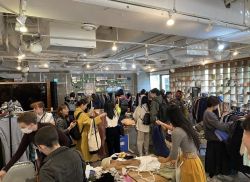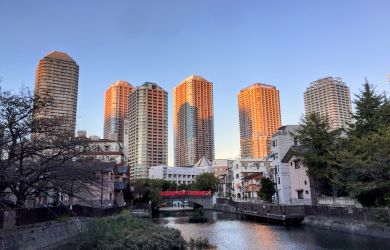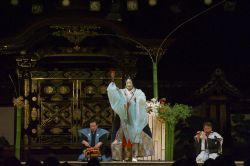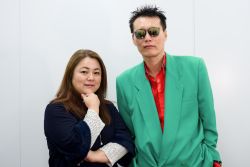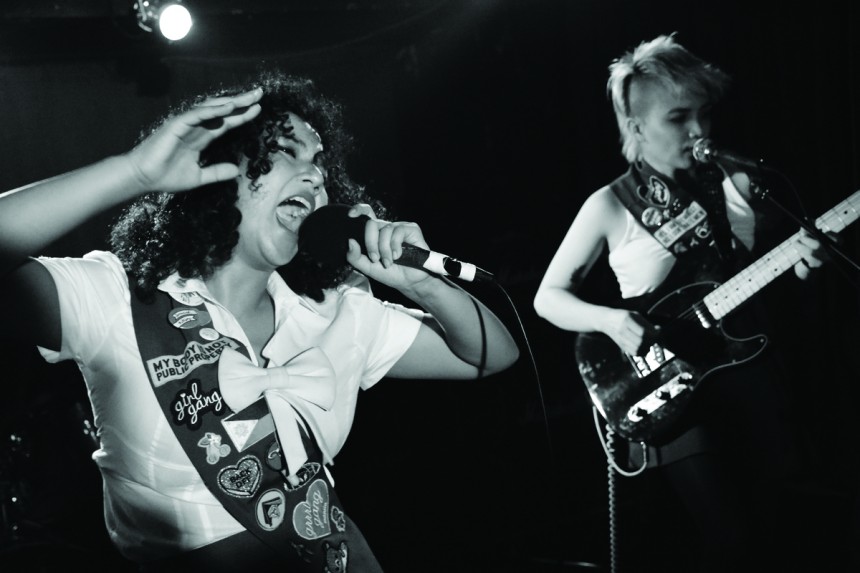
June 28, 2019
A Room of One’s Own
Exposing the highs and lows of a feminist Filipina band on tour
By Ian Martin
“Have you heard from the hospital yet? Is Mich going to be OK?”
It’s 6pm on Sunday, May 12, and I’m sitting outside the live venue Kircherr in Hamamatsu with three quarters of Filipina feminist punk quartet The Male Gaze. The event opened half an hour ago and the first band is just getting ready to start. The clock is ticking on The Male Gaze’s headlining appearance, but vocalist Michelle “Mich” Dulce is still waiting in the emergency room of a nearby hospital.
The organizers are making frantic arrangements to accommodate any last-minute schedule changes. Meanwhile, a rumor that something is wrong is snaking its way through the audience as they browse curiously through The Male Gaze’s suspiciously vaginal tote bags and pin badges.
As the person responsible for managing the tour, it’s time to start thinking the unthinkable.
“Can you play without her?”
The rest of the band — guitarists Mariah Reodica and Ymi Castel, plus drummer Ristalle Bautista — assure me they can handle it. Their tour mates, female-led Tokyo noise-punk band P-iPLE, agree to lend their vocalist Madca Kitabeppu as a guest singer for a couple of songs if worst comes to worst. Still, muddling through without their charismatic, stage-stalking frontwoman would be… different.
“Don’t worry. She’s Mich; she’ll be fine,” the band reassure me.
The chiming sound of reverb-drenched guitars winds its way up the staircase from below. I look at my phone — still no news from the hospital.
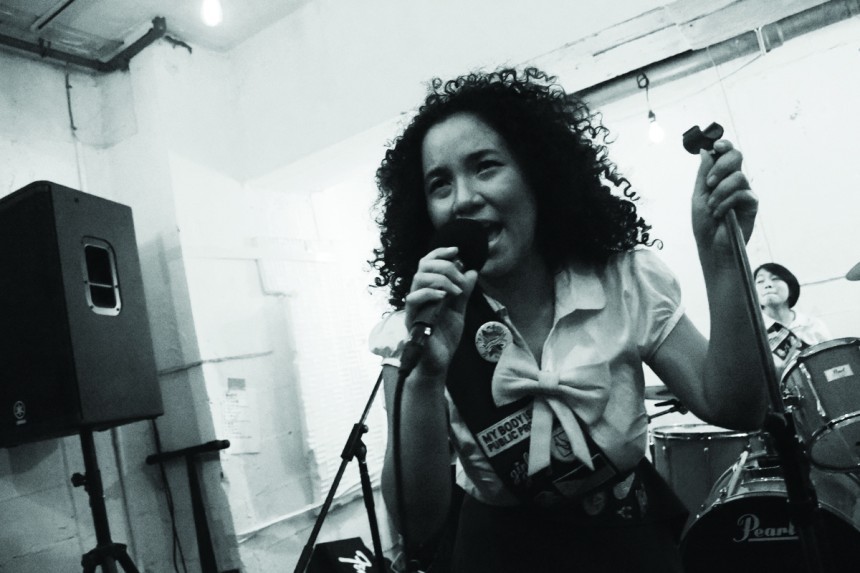
The genesis of The Male Gaze’s trip to Japan goes back a couple of years, and was really made possible by the energy and drive of two women.
I first met Mariah Reodica in 2016 — a 22-year-old student with the disaffected aura of a sad-sack middle-aged indie singer-songwriter, wrapped around an irrepressible ball of fearless enthusiasm, and backed up by undeniable songwriting talent — surfing the music bars and anarchist taverns of the western Tokyo suburb of Koenji. By the eve of her 2017 departure, Reodica was playing her fuzzy indie missives at Koenji’s notoriously anarchic Sound Studio Dom alongside P-iPLE’s jagged slashes of raw hardcore and oddball art-punk.
The Male Gaze didn’t exist at this point (although she had already released the excellent album Cell-o-phane with a melodic, 90s-influenced guitar pop band called The Buildings), but Reodica’s experience in Japan nonetheless had a subtle formative influence.
“There are a lot of interesting guitarists (in Tokyo) who do stuff that deviates from the macho, shred-heavy rock’n’roll machismo, and a lot of those guitarists happen to be women,” Reodica tells me while chatting online after the tour. “Also, lots of bands with unconventional arrangements like no bass, no guitars or whatever. Being in Japan last time is actually what inspired me to go bassless with The Male Gaze.”
Like so many of the people who wash through the subcultural rabbit warrens of Tokyo, her brief stay might have faded into memory like just another tourist were it not for P-iPLE guitarist Mayumi Oonishi.
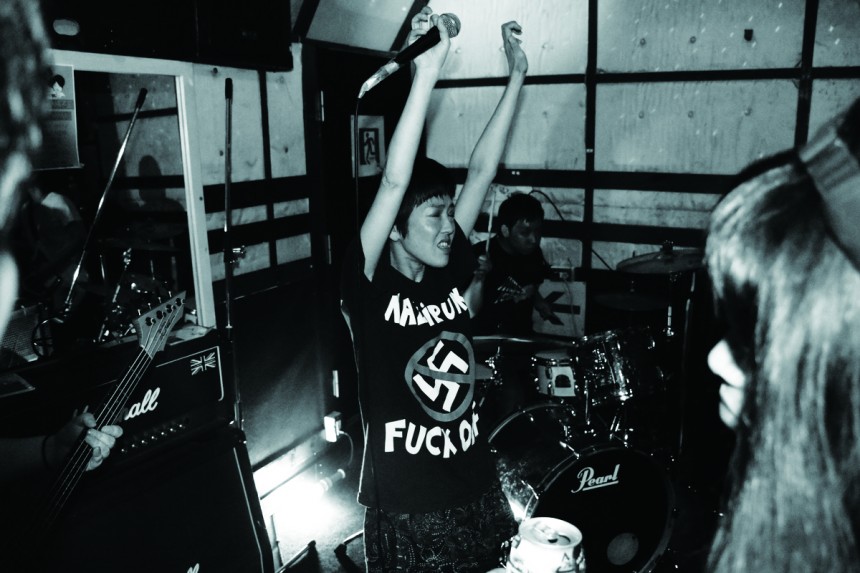
Coaxing action out of musicians and audiences alike can often be a fruitless and emotionally draining exercise, but ever since my early days organizing shows around Tokyo, Oonishi has been there making music with one band or another, supporting artists through shows she’s organized, or just going out and watching bands on drab Tuesday nights.
P-iPLE released a mini-album from my own Call And Response label in 2017, and the following year I heard from Oonishi that they were ready to record again, with the suggestion of releasing a split EP with an overseas band. Our thoughts quickly returned to Reodica, and especially the newly formed The Male Gaze.
The Male Gaze kicked off at the beginning of 2018. In addition to Reodica, fellow guitarist Castel radiates a quiet aura of self-possessed punk rock power. Bautista is probably the group’s most experienced member, with that quality so many drummers have, combining grounded dependability and the otherworldly sense that the song they are hearing exists on a subtly different cosmic frequency from the rest of us. Vocalist Dulce, meanwhile, is a strutting, headbanging, rock’n’roll preacher. In the parallel alien world of fashion she’s a world-famous milliner, while onstage she’s the living embodiment of a lifetime of punk rock.
Coming out of the backyard of proudly misogynist President Rodrigo Duterte, their outspoken feminist stance was a story ready-made for many international media organizations, including the BBC, CNN and i-D. This easy-to-grasp narrative may have had the unfortunate side effect of oversimplifying the band’s internal nuances, but with the powerful rock’n’roll engine at their heart, it ensured they would at least grab attention.
More importantly, their ferocious, garage-punk energy coupled with catchy hooks and spiky, art-punk guitar arrangements made them an ideal complement to P-iPLE’s more abrasive but equally hook-laden noise-punk. Gradually the EP and tour began to take shape.
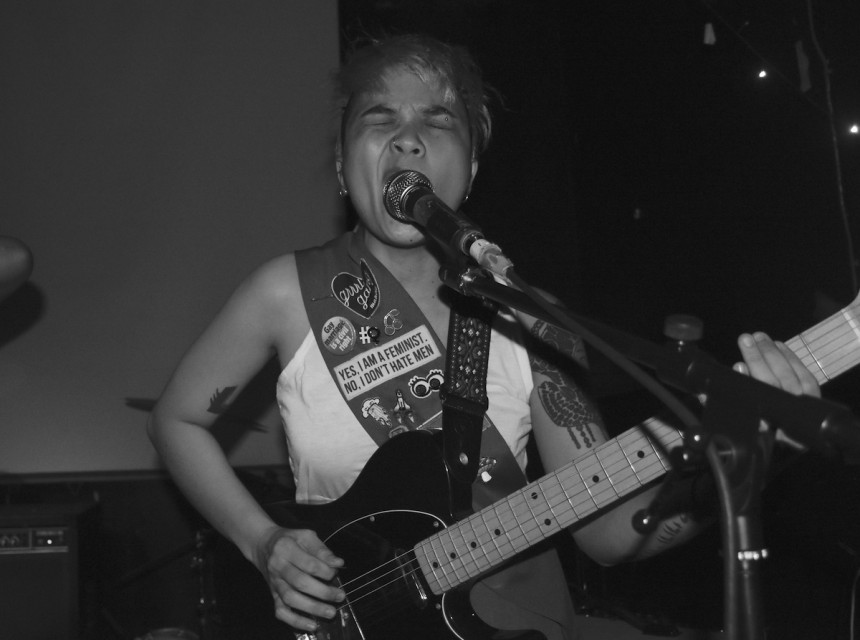
It’s May 9, the tour starts tomorrow and I’m at Narita Airport with my friend Shingo Nakagawa, guitarist in punk/alternative band Tropical Death. The Male Gaze’s flight has been delayed, so we’re both kicking back in a quiet corner of the airport and talking over the upcoming tour.
What stands out most to us is the contrast between how clear and direct The Male Gaze’s image and message are in comparison to most of the bands we work with. With a sound that consciously recalls bands like Sleater Kinney and Bikini Kill, a bold feminist stance and an image based on punked-up girl-scout uniforms, a one-line summary might read something like, “Feminism is the fun party to be at.”
How many underground bands around us could express themselves in such a clear and simple way? How many would instinctively recoil from such clarity, taking shelter under the veil of affected mystique?
The band finally make its way through customs and we engage in a ceremonial exchange of local alcoholic beverages: San Miguel for us, Strong Zero chu-hi for the visitors. The fears that have plagued my nights over the past few weeks — would the band’s visas be approved on time? Would the band’s anatomically explicit merch be allowed through customs? — are behind me. Everything is going to work out great from here.
The first show of the tour, at Moonstep in Nakano, was the only gig I organized entirely by myself, and as a white, male organizer behind the tour of an Asian feminist band, I didn’t want to get caught in the trap of celebrating my own righteousness. Rather, I wanted to pull together an event that quietly foregrounded female artists and would leave them to do whatever they wanted on their own terms.
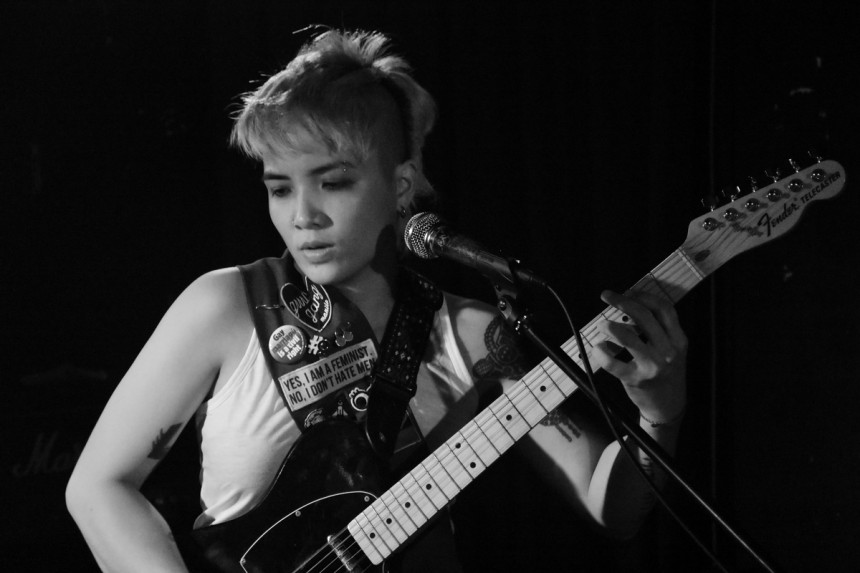
One of the DJs at Moonstep, Ayumi Tsubouchi, has been organizing parties under the name “Chicks Riot” for almost 20 years.
“I went to the original Ladyfest (in Olympia, Washington, 2000) and was moved to do an event for girls, by girls,” she explained over tea, a week after the tour. “But the situation in Japan was different to the U.S. — people think or feel different. Many girls might be feminist in private, but not in public — kind of ‘shy riot grrrls.’ They still make great music though, so I wanted to organize my events in a way that would be suitable for them.”
The Male Gaze, too, are wary of how feminism plays out in different arenas. Reodica makes the point that feminism in the Philippines cannot be separated from economic equality, and that the extreme wealth gap means even being able to label yourself a feminist is partly a function of privilege.
“To even have access to feminist literature or have the time to read it is a privilege, right?” she says. “If you’re too busy working five jobs for your family of ten kids, then most likely feminism takes a back seat.”
For Dulce, as the band’s frontperson, differences in translating feminist ideas between cultures were a key concern.
“Concepts regarding feminism are difficult enough to translate into Filipino,” Dulce explains. “So I was wondering how it would go in Japan, especially since Western ideas of what feminism is aren’t necessarily always applicable to the East, Philippines included.”
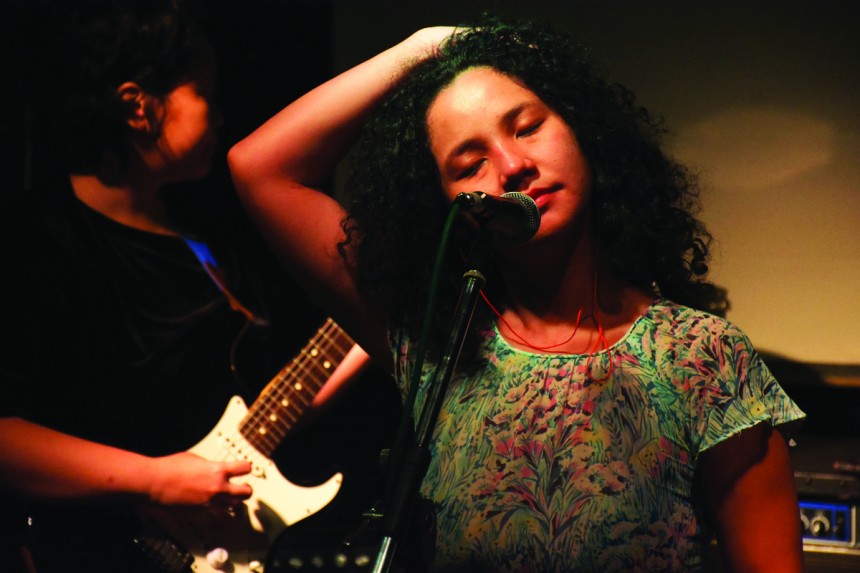
There’s nothing shy about The Male Gaze though, as their opening song “The Boss of Me” builds into a cascading litany of all the imperious, contradictory messages girls are bombarded with as they grow up.
“Wear less makeup / But fucking look good / Be a whore, but be his mother too.”
Dulce hypes herself into a frenzy, working through a repertoire of idiosyncratic dance moves that evolve into something increasingly sexual as she throws herself into “Commander Salamander.”
“This is a public cervix announcement / From the ladies in The Male Gaze who want to make it happen … ”
The audience has no idea what the words mean, but they understand it all just by watching the gradually building human tornado onstage. Halfway through the song, Dulce throws herself on the floor and cracks her head on the sharp edge of an effects pedal. It looks painful, but she carries on undaunted.
At one point, she wonders aloud why you’re not allowed to openly say a certain Japanese word for an intimate part of the female anatomy, pointing out, “It’s just a part of my body, the same as my arm or my head.” She urges everyone to liberate themselves from the taboo by chanting the offending word over and over again.
The audience response is raucous. If Japanese people in 2019 really are still shy about feminism, The Male Gaze’s combination of anger and cartoonish fun is like a battering ram to the remaining walls of their reticence.
Also at the event was a solo set by vocalist Sai from punk band Ms. Machine, who remarked on the contrast between the atmosphere at Moonstep and the way all-male mosh pits at her own band’s shows can deter female audiences
“The Male Gaze’s show was a great place, with lots of women in the front row,” Sai explains. “I thought what they’re doing is easy to understand and support for women and also men.”
The following day, The Male Gaze and P-iPLE hit the city of Matsumoto, up in the mountains of Nagano Prefecture, in a show supported by local record store Marking Records and its owner Riko Maeda. The venue, Give me little more, is a cozy, ramshackle little place by a beautiful riverside, and the bands get a fantastic reception, but Dulce’s head is getting worse, with sharp pains becoming more and more frequent.
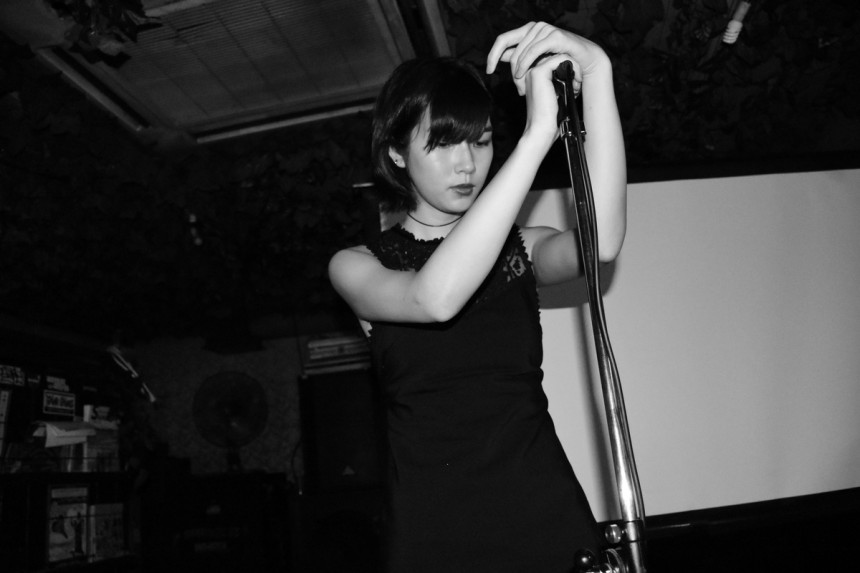
It’s May 12 and I arrive in Hamamatsu amid rising panic over the state of Dulce’s injury. “You need to have your head examined,” is something I often find myself wanting to yell at musicians, but rarely is it also the medically prudent thing to say.
The clock ticks and we wait for news. Reodica, Castel and Bautista don’t seem worried. It’s like they know their singer is indestructible.
As expected, it’s a concussion. With some reservations, the doctor gives Dulce the go-ahead to play, and ripples of relief run through the audience ahead of her triumphant arrival onstage. It’s ironic that as chaos swirls around the tour, The Male Gaze’s performances are getting tighter, the rapport with the audience getting easier as the band pick up more Japanese and find willing interpreters to help whip the audience up into their taboo-busting chants.
Throughout the remaining shows, it’s heartening to see a quiet momentum build as word-of-mouth leaks out over social media, culminating in a feature in the Japanese edition of men’s magazine GQ (of all places). There’s a riotous performance alongside “cheer-punk” band NiHao! at Koiwa Bushbash, an an eclectic event at the the stylish Ebisu Batica that runs from intimate acoustic ladry to ear splitting ting noise-rock and a jubilant, sold-out homecoming-of-sorts for Reodica in Koenji organized by P-iPLE. From these, a few patterns emerge.
One is that half of the organizers and more than half of the musicians on-stage are women. Another is that the appeal of a band like The Male Gaze, who stand for something that transcends genre divisions, can bring a fresh energy to the sometimes stiflingly introverted and fractured Tokyo underground scene, without ever seeming out of place within it.
This was a small tour of small venues, but it brought with it fresh faces and a fresh sense of fun — a sense of something cracking open that isn’t just about gender politics (although it was certainly that, too) but also about a music scene luxuriating in the breath of new life. Will it last? There’s always a danger that, while a rush of new energy from outsiders can be enthusiastically received, it’s also easily compartmentalized and locked away in the realm of the theoretical, treasured like an impossible dream. For those of us left behind, trying to coax life out of Tokyo’s dingy musical basements, the challenge is to look back on this tour and see what we can learn.
